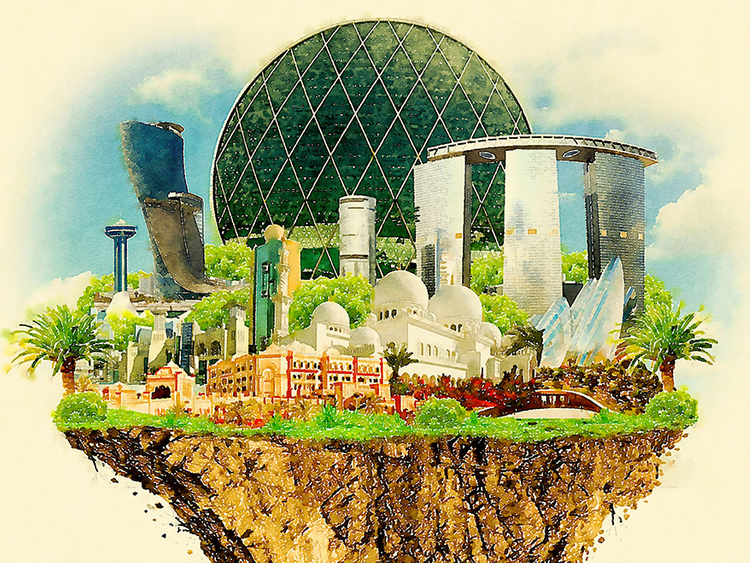Where do I put my money?
John Stevens, Managing Director of property managers Asteco, offers his view on the top areas to look at in Abu Dhabi:
“Depending on type, quality and location, all investment areas in Abu Dhabi — including Al Raha Beach (pictured), Saadiyat Island, Reem Island and Yas Island — comprise both complete and under construction projects of different quality, type and prices.
“TDIC’s Lagoons project is offering competitive pricing for off-plan villas with flexible payment plans, which is in turn piquing the interest of potential buyers.
“Even with current market slowdown, Reem Island and Al Raha Beach remain major areas for new investments.
“Yas Island includes prime products — with the exception of few high-quality projects — that have seen positive demand.
Forecast: Early clouds give way to sunny days
Haymaking season is still a while away, says Arlene Jimenea, Senior Research Analyst, CBRE Middle East
Through 2017 prices are likely to continue on a downward trajectory, the mood perking up over the next couple of years. “Despite improvements in average oil prices in the first quarter, there are still no apparent major demand generators that might significantly alter the current downward trend on rents.
“In the sales market, prices are likely to level off as more investors will likely opt to hold properties in light of low transaction activities and weak market sentiment.”
Over the medium term (2018-2020), the outlook remains positive on the back of growth estimates of 3.5-3.7 per cent by Abu Dhabi’s department of economic development. “The forecast growth is highly anchored on the continued robustness of the non-oil sector, with estimated growth rate of
6-8 per cent during the same period,” Jimenea says, but warns that market saturation remains a risk.
Five factors that are affecting the sector
Lukman Hajje, Chief Operating Officer of real estate portal Propertyfinder.ae, says there are several powerful factors shaping the property market. We asked what’s on his list
1. Expo 2020
The much-anticipated event has this year alone seen 47 construction contracts worth more than Dh11 billion awarded within the Expo site. “Microeconomics is about to witness a housing boom over the next three years, with prices rising and buyers pouncing on opportunities in 2017 to materialise their investments by 2020,” Hajje explains.
2. New supply
A host of new launches has been announced in Abu Dhabi and Dubai. Hajje cites the examples of powerhouses such as Sobha Group and Riviera Group in Dubai and Aldar in Abu Dhabi, all of which will deliver residential units this year. In Abu Dhabi in particular, look towards Aldar’s Mayan luxury development on Yas Island, being developed at a cost of Dh500 million.
3. VAT
The three letters on all our minds stand for a 5 per cent value-added tax the UAE plans to roll out from January. Details are still hazy, but Hajje says we can look to other countries: “Commercial properties may be taxed, and first sales of residential properties may include VAT too. This real estate market will need to start changing its administration processes and compliance procedures will need to adapt to the taxation system.”
4. New visa policies
The UAE recently implemented a visa-on-arrival policy for Russian and Chinese citizens, Hajje says. “This was due to more than one million collective visitors from both countries within the past year. The new visa regulation is expected to boost tourism and that is an obvious and natural trigger for real estate investments.”
5. Indian buyers
India’s roaring economy has enriched its middle class, who are now considering opportunities in the UAE. “India invested Dh12 billion in Dubai property last year, which makes it the biggest expat investor. Now that India’s demonetisation policy has rocked its country, more citizens are expected to further buy into the UAE property sector and reap the benefits,” Hajje says.
The 5 per cent rent cap
Ivana Gazivoda Vucinic, Head of Advisory & Research at Chestertons Mena, says the move will help stabilise the property sector
In December, Abu Dhabi reinstated a rent cap of 5 per cent on all residential properties. “However, given current market conditions, many landlords are keen to ensure their properties are occupied, [and] are unlikely to increase or ask for anything above current market rates. When the market starts to pick up, which we estimate to be in 2018, the cap will ensure tenants can forecast their expenses and price fluctuations remain minimal," says Vucinic.
“For affordable products, Al Reef offers a community with affordable good-quality products that are still recording positive demand.”
















